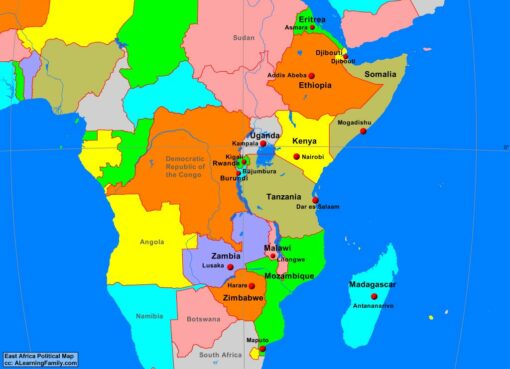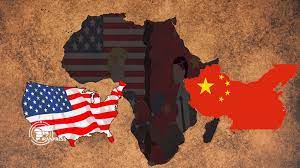Major events trending during the week (October 17-23) include India-Africa Defence Dialogue, Killing of Indian IT experts in an apparent political factional fighting in Kenya, East African Crude Pipeline and western concerns, and South Africa and Saudi Arabia sign agreements worth $15 billion.
India-Africa Defence Dialogue
The second India-Africa Defence Dialogue (IADD) was held on the sidelines of DefExpo 2022 in Gandhinagar, Gujarat on October 18, 2022. The two sides explored new areas of cooperation for defence engagements, including capacity-building, training, cybersecurity, maritime security and counterterrorism. Addressing the meeting, Defence Minister Rajnath Singh said that India and African countries are important stakeholders in ensuring a safe and secure maritime environment, especially in the Indian Ocean region. The Gandhinagar Declaration charted out new areas for enhancing the India-Africa defence and security partnership. It proposes to enhance cooperation in the field of training in all areas of mutual interest by increasing training slots and deputation of training teams, empowerment and capability building of defence forces of Africa, participation in exercises and humanitarian assistance during natural disasters. India offered fellowships for experts from African countries through Manohar Parrikar Institute for Defence Studies and Analysis. Fifty African countries, including 20 Defence Ministers, seven Chief of Defence Staff and Service Chiefs participated in the dialogue. The first IADD was held in Lucknow in February 2020. It will now be held biennially along with DefExpo.
India’s defence equipment is proving to be highly competitive in their effectiveness and price. The African delegates showed interest in light combat helicopters, patrol vessels, small arms, shoulder-fired rockets, Pinaka multi-barrel rocket launchers, and surveillance drones, among others. India’s bilateral trade with Africa has reached $ 89.5 billion last year from $ 56 billion the previous year, making India the fourth-largest trading partner of Africa.
Two Indians killed in apparent political factional fighting in Kenya
Two Indian nationals, Zulfikar Ahmad Khan, former COO of the Balaji Telefilms, and his friend Mohamed Zaid Sami Kidwai, who were missing in Kenya for nearly three months, were killed by the country’s notorious Special Forces Unit, which was disbanded by the new government of President William Ruto. Announcing the deaths, Denis Itumbi, a Presidential adviser said they were part of the social media team of Ruto and helped in his electoral campaign. The SSU was accused of many extra judicial killings and enforced disappearances under the previous Kenyatta government.
While investigations are continuing to find out the reasons behind the killings, initial indications show the perils of foreign experts wading into African political factional fighting.
East African Crude Oil Pipeline
Uganda and Tanzania are set to begin work on a massive crude oil pipeline, dismissing objections from the International Energy Agency and the EU over environmental and climate concerns. The East African Crude Oil Pipeline (EACOP) will transport oil produced from Uganda’s Lake Albert oilfields to the port of Tanga in Tanzania from where the oil will be exported to world markets. Eighty percent of the 1,440km- (895 mile) pipeline will be in Tanzania including a terminal-storage facility in Chongoleani. French energy giant Total Energies and Chinese energy firm CNOOC International also have a stake in the $5bn (£4bn) venture. Because of the waxy nature of Lake Albert’s crude oil, it will be transported through a heated pipeline – the longest in the world. But only a third of the reserves of 6.5 billion barrels, first discovered in 2006, is deemed commercially viable. The first oil is expected to be tapped in three years with at least 230,000 barrels pumped out every day at its peak – projected to earn Uganda between $1.5bn-$3.5bn a year, 30-75% of its annual tax revenue. Tanzania will reportedly get at least $12 a barrel, close to $1bn a year.
Brushing aside the concerns of the IEA and the EU, the Ugandan and Tanzanian governments, which see the pipeline as vital to turbo-charge their economies, point out that Africa has only emitted 3% of climate-warming gases compared to 17% from EU countries. Crucially, 92% of Uganda’s energy already comes from renewable sources. In Tanzania, it is about 84%. Whereas for the EU it is 22%, according to the International Renewable Energy Agency.
Somalia measures to stop funding to Al-Shabaab
Somalia government ordered businesses in the country to stop all funding to terrorist group, al-Shabaab, or else risk their business licenses revoked. This followed the US Treasury Department’s sanctions on more than a dozen individuals in Somalia and Yemen for their alleged funding of the terror group’s activities in Somalia. The crackdown on al-Shabaab’s finances coincides with a renewed Somali government effort to prevent media agencies form “propagating” al-Shabaab publicity. The new orders followed a major al-Shabaab attack on a military base in central Hiraan region which was repelled but led to the death of three soldiers. The African Union Transition Mission in Somalia has also announced its commitment to open new joint operation centres in Somalia to fight the terrorist group.
It may be recalled that al-Shabaab had recently invited media personnel to areas under its control and gave interviews exhibiting their empathy to the public and various social services introduced for the welfare of people in their areas, in contrast to corrupt politicians and their foreign supporters. The soft propaganda highlighted the terror group’s concern for environmental issues such as banning of plastic products in their area of control.
South Africa and Saudi Arabia signed agreements worth $15 billion
South Africa and Saudi Arabia have signed several agreements worth more than $ 15 billion during the visit (October 15-16) of President Cyril Ramaphosa to Saudi Arabia. These include cooperation in agriculture and allied fields, energy matters, transport and defence sectors. They also agreed to establish a joint investment fund and a joint business council. Ramaphosa and Saudi Crown Prince Mohammed bin Salman have also agreed to a strategic partnership in the digital economy and information technology.
Saudi Arabia is a late entrant into Africa compared to its Gulf partner, the UAE, and is seeking stronger economic relations with several countries in Africa. It has recently signed projects with CAR, Senegal.




